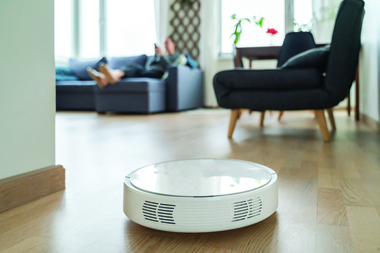Convenience can put you at a cybersecurity risk

- by Jesse Ledford
BOK Financial
Our robot vacuums quietly buzz around, making our lives a little easier—but convenient smart gadgets like this can open the door for cybersecurity risk if we’re not careful.
Smart home appliances, such as robot vacuums, smart lights, or garage doors, may seem like harmless home must-haves, but they’re part of the “Internet of Things” – devices that connect to your Wi-Fi to automate everyday tasks. But unlike laptops or smartphones, these items lack the same level of built-in protection. So, it’s best to isolate them on their own network.
Keeping these devices on a separate network from your primary devices can be an extra layer of safety. It helps protect your sensitive data if one of your smart gadgets gets compromised. You can do this by setting up a guest network. More tech-savvy individuals may consider setting up a VLAN. These help prevent your vacuum from communicating with your phone, laptop, or work files – so even if it’s hacked, the threat stops there.
Consider setting up an email address exclusively for authenticating to your IoT devices. This process would help mitigate the risk of phishing or social engineering on your day-to-day email addresses, which are often used for more sensitive accounts, such as financial, tax, and social media.
Also, disable any unnecessary features or settings on the device, and adjust privacy settings to limit data collection and sharing.
Another great way to protect yourself is to regularly update firmware and software. Often, firmware updates include security updates that help patch identified vulnerabilities. It’s easy to keep putting off these updates “for next time,” but they’re crucial to safeguarding your smart devices.
Be sure to actually read the privacy and data security policies before buying your next IoT gadget. Robot vacuums map your floors while they roam, allowing them to clean more efficiently. But they’re often doing more than just mapping; many models are collecting data on what your rooms look like, your daily routine and when you’re home, and even what is being said nearby.
Be careful, because some models even include microphones or cameras, while apps gather usage patterns, device metadata, and door and window locations. While this data is primarily used to improve functionality, many companies sell it to third parties or share it with supply-chain providers. It’s all outlined in the privacy policy – and by agreeing to it, you’re allowing that data to be used in ways you may not expect. If you’re looking for that extra step to reduce exposure, consider choosing a camera-free model or one that works offline, which can help.
If you still want the convenience of robot vacuums or other smart gadgets for your home, stick to more reputable brands, as off-brand devices may be less likely to have robust security and privacy programs.
And it’s best to cultivate a zero-trust mindset when choosing any smart devices, including robot vacuums. Some robot vacuum brands prioritize data security and privacy, but it’s still crucial to be aware of potential data security and privacy risks.
The Gayly online. 10/29/2025 @ 12:55 p.m. CST.





